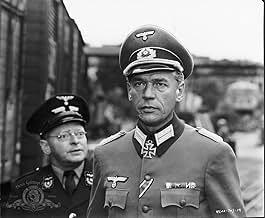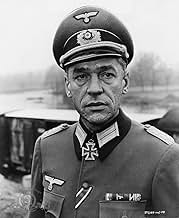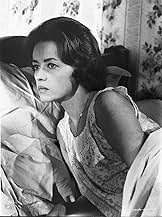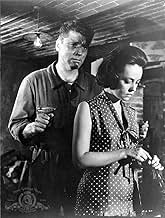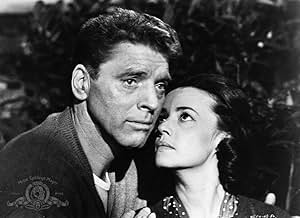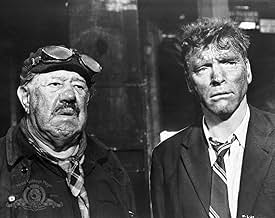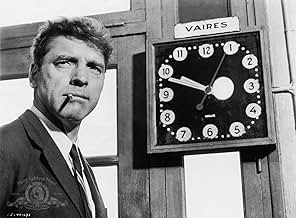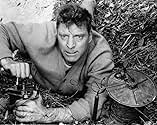Nel 1944, un colonnello tedesco carica un treno con tesori d'arte francesi da inviare in Germania. La Resistenza deve fermarlo senza danneggiare il carico.Nel 1944, un colonnello tedesco carica un treno con tesori d'arte francesi da inviare in Germania. La Resistenza deve fermarlo senza danneggiare il carico.Nel 1944, un colonnello tedesco carica un treno con tesori d'arte francesi da inviare in Germania. La Resistenza deve fermarlo senza danneggiare il carico.
- Regia
- Sceneggiatura
- Star
- Candidato a 1 Oscar
- 1 vittoria e 3 candidature totali
- Didont
- (as Albert Remy)
- General Von Lubitz
- (as Richard Munch)
- Sergeant Schwartz
- (as Donal O'Brien)
- Pilzer
- (as Art Brauss)
- Major
- (as Jean-Claude Berco)
Recensioni in evidenza
Seeing 'The Train' two days ago, what instantly came to my mind after watching was "wow!" Like most people here, to me this was a pretty exceptional film that really packs a punch in a way that not many films of its year, decade or even genre at this point of film history did. Truly powerful work that took risks and pulls no punches in a way that still has the ability to shock, no trivialising or sugar-coating here. Quite the opposite. As far as WWII films go, it is one of the best and despite being highly praised deservedly more people should know about it, it is really quite something and unlike a lot of films personally seen.
Maybe 'The Train' runs a little too long by about 15 minutes or so, which occasionally (emphasis on that word) affects the pace.
On occasions too early on, for my tastes Maurice Jarre's music score jarred a bit and like it belonged more in a comedy.
Conversely, there are so many strengths (which is actually pretty much everything else) and everything else is executed flawlessly. 'The Train' is quite masterful visually, the photography is full of atmosphere and played a huge part in making the train itself like its own character. Have never seen a train so cleverly, intimately and powerfully used. The French locations are incredibly well utilised, some of the best use of French locations for any film seen in a long time from personal view. On a technical level, the action with the train is enough to make the jaw drop today. Frankenheimer's direction is hugely accomplished and not since 'The Big Parade' as far as recent film viewings go has there been direction for any film that was this visually flawless. Most of Jarre's score works very well, when it becomes more subtle and more harmonious with the atmosphere it is quite hauntingly unsettling.
Script is very intelligent and thought-provoking, taut enough while allowing breathing space yet not rambling. The story is hugely compelling, is very intense especially the exciting action with the train and is emotionally powerful. Found myself quite moved and shocked at how much the more uncompromising moments (and there are many) wrenched the gut, haven't seen an ending this poetic in a while either. The characters are well defined and interesting. There are great performances from all, with Lancaster superb in one of his best performances. He tells so much with his face and eyes and could tell he meant every word with his line delivery, he is especially good in the last twenty minutes where words are few but one intensely feels his hurt and anger. Scofield has seldom been nastier or at times even frightening. Jeanne Moreau's role isn't huge but she is sympathetic in it and an atypically cast Michel Simon is very telling in his.
In summary, exceptional and one of the best WWII films. 9/10
Burt Lancaster stars as a French train engineer that has to transport the shipment. At first is not a easy task, but he succeeds in the end. Meanwhile he becomes friend with a hotel owner played by French actress Jeanne Moreau (that passed away last year). And the other members of the cast are fine. Paul Scofield as a German general is great (and Scofield also starred in other great movies after this), and it was a treat seeing French comedian Michel Simon in a war movie (just like Bourvil in THE LONGEST DAY).
This movie had great direction by John Frankenheimer, great performances by all the actors, and also great photography in Black and White. Although a bit dragged in some places, it was still great to watch! And as a fan of the history from 1850 until these days, I liked the movie for his accuracy and his action scenes.
Almost everything that Burt Lancaster does, or experiences in John Frankenheimer's, THE TRAIN seems real, necessary and interesting. He did all his own stunts in the film, learned to cast driving axle-bearings, which we see in the film in a continuous take. Frankenheimer was one of the true masters of the audacious, complicated, continuous scene and this film has many astounding set-pieces. The film is also one of the last great films shot in deep focus black and white (mostly with a 25mm lens) and it is the bold, striking compositions of the intense and vigorous action that elevates the film to an even higher level. Frankenheimer never took the bland, straightforward choices of blocking and positioning the camera in his films - certainly not in the first half of his career and THE TRAIN is a veritable textbook in imaginative visual directing.
There is great sense of danger in the film, much like the feeling that THE WAGES OF FEAR produces - and indeed in one scene, we see an actual train-crash that smashed nine cameras, and was only captured by one camera which yielded one of the most startling shots in all of Cinema! The whole film has sense of almost reckless daring, but was carefully controlled throughout. The scene where Albert Rémy uncouples the engine from the cars is insane! I can't think of another film where a key actor does something so dangerous on their own, with a stunt double.
But all of these scenes and shots serve the story, which is in itself fascinating. It asks the question: What is more important - irreplaceable works of art or the lives of common human beings? Col. von Waldheim is an unorthodox Nazi, who has a deep admiration for 'decadent' paintings and is willing to save them possess or save them at any cost , regardless of his orders. Paul Labiche knows trains inside out, but a painting means as much to him as "a string of pearls to an ape," but his morals are infinitely more compassionate than von Waldheim, which he makes clear without speech at the end - where, in fact, twenty minutes go by without Lancaster uttering a single word, which was unheard of them of a superstar male actor, but it totally appropriate. It is one of the great performances in all of war/action Cinema, I feel. And his antagonist is the legendary Paul Scofield in his first screen appearance in six years, who is, as always, magnificent. Everyone did a first-rate job on this film, yet only the screenwriters were nominated for the 1966 Oscars (the film was not released until May 1965 in the USA) which is yet another example of Academy madness.
Everything about THE TRAIN is unconventional. It was made at a time when other studios and directors would have gone for colour and CinemaScope, Frankenheimer went for deep-focus, black and white 1.66:1, went for authenticity, verisimilitude - no back-projection or models. Arthur Penn actually began the film, but I have never been able to ascertain how much material he shot, or why he was fired, but it would have been a very different movie; Frankenheimer's vigorous, but elegant style is so perfectly right for this film.
One thing that makes some films extra special is those that have many scenes where a process is at work and is shown in detail, seem more powerful. One cannot shown process in any other medium of art. Heist scenes, as in THE ASPHALT JUNGLE, RIFIFI, LE CERCLE ROUGE, etc are prime examples, the escape preparations in Robert Bresson's, A MAN ESCAPED and Jacques Becker's, LE TROU are also enthralling and 'make' each movie what it is. The working out of a life-or-death puzzle, as in BLOW-UP, THE CONVERSATION and De Palma's, BLOW OUT also illustrate the power of the medium. What makes these scenes - 'process of action' - interesting and occasionally powerful, is that they make us look at human interaction with matter is a different, even deeper way. Slow motion cinematography remains one of man's greatest inventions. Before it, we had no idea how fast moving objects worked or behaved. There was over 50 years of gunfire in Cinema, until we saw what a bullet leaving the barrel of a gun looked like, in THE OMEN (1976). It spins, for one thing. That must have surprised many people.
On the whole and after seeing it for the first time in about six years, I firmly feel that THE TRAIN is one of the greatest action films ever made, not only for its audacious crashes, bold style and unobtrusive score by Maurice Jarre, but also for it simply being a fascinating and unusual story this is brilliantly acted.
Burt Lancaster is Labiche, a French station manager who becomes entangled in efforts to prevent German Colonel Von Waldheim (Scofield) from shipping hundreds of classic pieces of artwork out of Paris before the Allies re-take the city.
John Frankenheimer has done an excellent job putting every aspect of great storytelling together. The most essential part is the characters. Lancaster is absolutely great as Labiche. While the French want him to simply delay the train, Labiche is always more concerned about the human cost. Eventually, so many men are killed in the attempt to delay the train that he takes it upon himself to save the artwork so they did not die in vain. On the opposite side, Scofield makes a very believable, maniacal officer. He is purely obsessed by art. He's not your typical Hollywood "Nazi" officer; here, his one goal is not eradication of the Jews or whatnot - it's to steal millions of dollars worth of paintings for personal gain.
The French are played, for the most part, by young native French actors. Michel Simon plays a grizzled old engineer who tries to take matters into his own hands, at first, when Labiche won't aide the cause. Albert Remy (IS PARIS BURNING?) and Charles Millot (THE BATTLE OF NERETVA) are Labiche's resistance sidekicks, both passionate in their rather minor roles. Jeanne Moreau (THE VICTORS) makes a pretty big impression as a hotel owner who gets caught up the fight and elects to help Labiche, even though it will hurt her business and put her life in danger.
In support, the cast is made up of some very fine young actors who would become mainstream faces in later European war movies. Wolfgang Preiss (THE LONGEST DAY) makes an impression as the German Major commanding a rail yard, who is just simply trying to keep his facility running well and doesn't want to deal with Von Waldheim. The great Richard Munch (PATTON) has one strong scene as a German general, who knows the front line battle is more important than Von Waldheim's art. Howard Vernon (FROM HELL TO VICTORY) is the German captain with glasses in charge of the train; Donald O'Brien (DEADLY MISSION) is a very mean-looking Sergeant keeping Lancaster and Remy in check; and Arthur Brauss plays the German Captain interrogating the stationmaster.
The second essential portion of the story goes to the purely technical side of the production. First of all, there are some truly spectacular action sequences. Most of them were done with real locomotives, on life-size sets with authentic explosions. One huge, three-way head-on-collision is awe-striking and must have marvelous to see on the big screen. Lancaster performs all of his own stunts; jumping from control towers, running and catching moving trains - all, one would think, would be difficult for a man of 51 - but Lancaster doesn't show a bit of strain. A good deal of the action centers around simply moving trains and equipment through railyards, and it's all portrayed with acute attention to authenticity and detail.
At key moments, Frankenheimer uses his typical unorthodox filming technique to give the action a new perspective. The camera zooms in on every day objects, which actually have key importance at that one moment. He follows Labiche down a hallway with a handheld camera simply because it's the best way of showing how he gets to where he's going. All of this is trademark Frankenheimer direction, and it gives the film a sharp, cutting edge to its already awesome plot. Sincerely, standard direction with all of the same elements would really lessen the impact of the punch every other element packs.
A few side notes: the scenery is great; each town, village set piece, actual location or open countryside looks just like 1944 France. Maurice Jarre's rousing music score is great and is quickly becoming one of my favorite war movie themes, ranking with the works of Jerry Goldsmith, Ennio Morricone, Elmer Bernstein and John Williams.
I saw this movie on Turner Classic Movies, letterboxed about 1.66:1. This is apparently a transfer directly from the DVD. The print is excellent: the black and white image is sharp, the sound is clear and appropriately loud; and there is hardly a scratch or speckle to be seen. The DVD is probably worth buying for the commentary track it holds, but I have not yet viewed the disc.
THE TRAIN is an instant classic from the Golden Age of cinema, with every element working perfectly.
RATING: 10/10
Lo sapevi?
- QuizBurt Lancaster performed all his own stunts in this movie. Albert Rémy also got into the act by performing the stunt of uncoupling the engine from the paintings train on a real moving train.
- BlooperWhen the German officer in the train thinks they've arrived in Germany, he takes a look at his map and we see Strasbourg (Alsace, France), the France-Germany border and Baaden-Baaden (Germany). During German occupation of France, Alsace and Strasbourg were annexed to the German Reich, i.e. this German military map should have shown a different border (100 km West) and Strasbourg should have been in Germany.
- Citazioni
Colonel von Waldheim: Labiche! Here's your prize, Labiche. Some of the greatest paintings in the world. Does it please you, Labiche? Give you a sense of excitement in just being near them? A painting means as much to you as a string of pearls to an ape. You won by sheer luck: you stopped me without knowing what you were doing, or why. You are nothing, Labiche -- a lump of flesh. The paintings are mine; they always will be; beauty belongs to the man who can appreciate it! They will always belong to me or to a man like me. Now, this minute, you couldn't tell me why you did what you did.
- Curiosità sui creditiOpening credits prologue: PARIS August 2-1944 1511th day of German occupation
- Versioni alternativeWhilst the official run time is 133 minutes, the BBFC website has two separate entries, one with a theatrical 'U' rated certificate in 1964 running at 141 minutes 31 seconds and the other entry with a theatrical 'A' rated certificate in 1959 running at 90 minutes 37 seconds. Though the second entry seems incorrect due to the erroneous date of certification being 21 October 1959 (the film was being made in 1963 and is copyrighted in 1964) and a much shorter run time, the BBFC reference numbering is in sequence with the later video rated entries so it is unknown if this 1959 entry is a much shorter cut of this film or this is an error in the BBFC records. It is also not known if the 142 minute entry is a longer cut of the film that has simply not been since it's UK theatrical release in 1964.
- ConnessioniFeatured in Film Review: Burt Lancaster (1968)
I più visti
- How long is The Train?Powered by Alexa
Dettagli
- Data di uscita
- Paesi di origine
- Lingue
- Celebre anche come
- El tren
- Luoghi delle riprese
- Acquigny, Eure, Francia(trains pile-up, 49°10'22.73"N, 1°10'44.84"E)
- Aziende produttrici
- Vedi altri crediti dell’azienda su IMDbPro
Botteghino
- Budget
- 6.700.000 USD (previsto)
- Tempo di esecuzione2 ore 13 minuti
- Colore
- Proporzioni
- 1.66 : 1
Contribuisci a questa pagina



